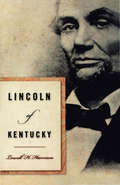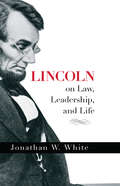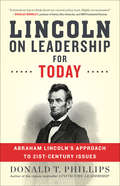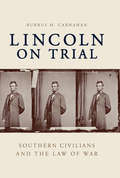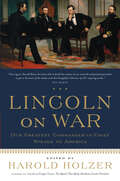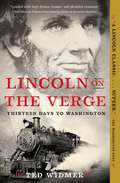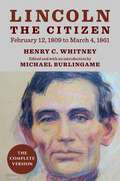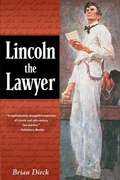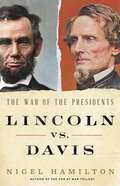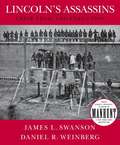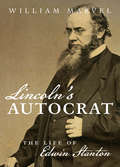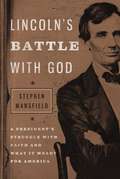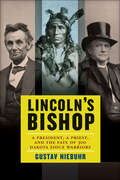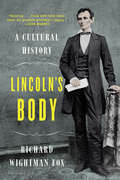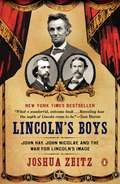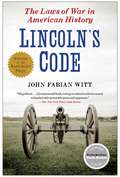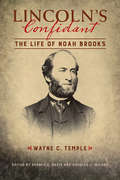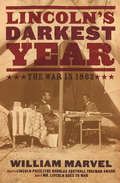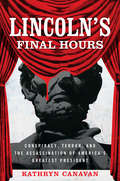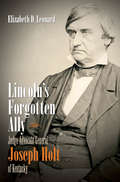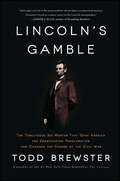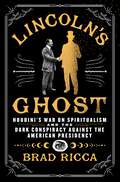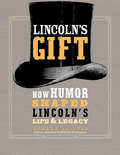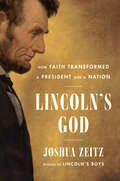- Table View
- List View
Lincoln of Kentucky
by Lowell H. Harrison&“Covers Lincoln&’s background in Kentucky and his lifelong association with the state of his birth . . . entertaining . . . well researched.&” —Louisville Courier-Journal Young Abraham Lincoln and his family joined the migration over the Ohio River, but it was Kentucky—the state of his birth—that shaped his personality and continued to affect his life. His wife was from the commonwealth, as were each of the other women with whom he had romantic relationships. Henry Clay was his political idol; Joshua Speed of Farmington, near Louisville, was his lifelong best friend; and all three of his law partners were Kentuckians. During the Civil War, Lincoln is reputed to have said, &“I hope to have God on my side, but I must have Kentucky.&” He recognized Kentucky&’s importance as the bellwether of the four loyal slave states and accepted the commonwealth&’s illegal neutrality until Unionists secured firm control of the state government. In this book, Lowell Harrison emphasizes the particular skill and delicacy with which Lincoln handled the problems of a loyal slave state populated by a large number of Confederate sympathizers. It was not until decades later that Kentuckians fully recognized Lincoln&’s greatness and paid homage to their native son. &“An outstanding work.&” —James A. Ramage, author of Gray Ghost: The Life of Col. John Singleton Mosby
Lincoln on Law, Leadership, and Life
by Jonathan WhiteWisdom and stories from one of America's most unique legal mindsAbraham Lincoln's success as a politician was rooted in experience in the courtroom. Despite a presidency plagued with moral and legal crises, this self-taught prairie lawyer deftly led the nation by relying on the core principles he honed in his early career: honestly, self-discipline, and a powerful sense of social responsibility. Aspiring and practicing lawyers alike often looked to Lincoln for guidance--and his hard-won wisdom is as relevant today as ever.Drawn from his correspondence with aspiring attorneys as well as observations from friends and colleagues, Lincoln on Law, Leadership, and Life is an insightful collection of Lincoln's timeless quotes, quips, and stories."This should be required reading in every law school in America."--Frank J. Williams, retired Chief Justice, Rhode Island Supreme Court, and founding chair of The Lincoln Forum.
Lincoln on Leadership for Today: Abraham Lincoln's Approach to 21st-Century Issues
by Donald T. Phillips&“Phillips has a gift for making 19th-century history relevant for the 21st century . . . a marvelous way to think about our current policy woes.&” —Douglas Brinkley, New York Times-bestselling author of American Moonshot How can President Lincoln&’s wisdom be applied to the most pressing conflicts of modern-day America? With a fresh and perceptive reading of Lincoln&’s own writings and speeches, bestselling author Donald T. Phillips reveals how America&’s sixteenth president handled many of the same national dilemmas we face today. Looking to his exemplary leadership of a fractured nation, Phillips offers a deeply relevant analysis of how Lincoln&’s example could help forge solutions to the many issues and divisions challenging our country now. &“[An] intelligent and often moving look at one of the nation&’s greatest presidents . . . Using his extensive knowledge of Lincoln, Phillips makes convincing cases throughout for what the nineteenth-century statesman&’s opinion would be on a wide array of issues faced by the twenty-first-century United States, including climate change, torture, immigration, and equal pay for women. For readers who find present-day politics almost too much to contemplate, Phillips&’s closing vision of Lincoln witnessing the &‘current state of affairs&’ will be especially poignant and bittersweet.&” —Publishers Weekly
Lincoln on Trial: Southern Civilians and the Law of War
by Burrus M. CarnahanThe acclaimed Lincoln scholar examines the president&’s treatment of Southern civilians during the Civil War, shedding new light on his wartime conduct. By twenty-first century standards, President Lincoln's adherence to the laws of war would be considered questionable. But could be condemned as a war criminal based on the accepted standards of his time? Lincoln&’s critics, past and present, have not hesitated to make the charge, while his apologists defend his actions as reasonable and humane. In Lincoln on Trial, Burrus M. Carnahan examines Lincoln's leadership throughout the Civil War as he struggled to balance his own humanity against the demands of his generals. Carnahan specifically scrutinizes Lincoln's conduct toward Southerners in light of the international legal standards of his time as the president wrestled with issues such as bombardment of cities, collateral damage to civilians, seizure and destruction of property, forced relocation, and the slaughter of hostages. Carnahan investigates a wide range of historical materials from accounts of the Dahlgren raid to the voices of Southern civilians who bore the brunt of extensive wartime destruction. Through analysis of both historic and modern standards of behavior in times of war, a sobering yet sympathetic portrait of one of America's most revered presidents emerges.
Lincoln on War: Our Greatest Commander-in-Chief Speaks to America
by Harold HolzerPresident Lincoln used his own weapons—his words— to fight the Civil War as brilliantly as any general who ever took the field. In Lincoln on War, historian Harold Holzer gathers and interprets Lincoln’s speeches, letters, memoranda, orders, telegrams, and casual remarks, organizing them chronologically and allowing readers to experience Lincoln’s growth from an eager young Indian War officer to a middle-aged dove congressman to a surprisingly hardened and determined hawk as the Union’s commander-in-chief.We observe a man willing to sacrifice life and treasure in unprecedented quantities, to risk wounding the pride of vain generals, and even to mislead the public if it meant the preservation of an unbreakable union of states, the destruction of slavery, and the restoration of America as an example to inspire the world. This volume covers strategy; tactics; the endless hiring, sustaining, motivating, and dismissal of commanders; military discipline; and military technology. Modern commanders-in-chief have repeatedly quoted Lincoln to justify their own wars, so it behooves us as citizens to know Lincoln’s record well. From masterpieces such as the Gettysburg Address to lesser-known meditations on God’s purposes, Lincoln on War is the first book to highlight exclusively Lincoln’s sublime and enduring words on war.
Lincoln on the Verge: Thirteen Days to Washington
by Ted WidmerAs a divided nation plunges into the deepest crisis in its history, Abraham Lincoln boards a train for Washington and his inauguration—an inauguration Southerners have vowed to prevent by any means necessary. Drawing on new research, this account reveals the President-Elect as a work in progress, showing him on the verge of greatness, foiling an assassination attempt, and forging an unbreakable bond with the American people. On the eve of his 52nd birthday, February 11, 1861, the President-Elect of the United States, Abraham Lincoln, walked onto a train, the first step of his journey to the White House, and his rendezvous with destiny. But as the train began to carry Lincoln toward Washington, it was far from certain what he would find there. Bankrupt and rudderless, the government was on the verge of collapse. To make matters worse, reliable intelligence confirmed a conspiracy to assassinate him as he passed through Baltimore. It is no exaggeration to say that the fate of the Republic hung in the balance. How did Lincoln survive this grueling odyssey, to become the president we know from the history books? Lincoln on the Verge tells the story of a leader discovering his own strength, improvising brilliantly, and seeing his country up close during these pivotal thirteen days. From the moment the Presidential Special left the station, a new Lincoln was on display, speaking constantly, from a moving train, to save the Republic. The journey would draw on all of Lincoln&’s mental and physical reserves. But the President-Elect discovered an inner strength, which deepened with the exhausting ordeal of meeting millions of Americans. Lincoln on the Verge tells the story of America&’s greatest president and the obstacles he overcame, well before he could take the oath of office and deliver his inaugural address.
Lincoln the Citizen, February 12, 1809 to March 4, 1861: The Complete Version (The UIS Center for Lincoln Studies)
by Henry C. WhitneyWritten by a longtime friend and ally, Lincoln the Citizen offers a rare character study and insightful biography of Lincoln before he became president. Michael Burlingame restores material cut by editors of the original 1907 publication to present Henry Clay Whitney’s work in full. Whitney’s work reveals the legal and political spheres where Lincoln moved while providing eyewitness accounts and intimate stories shared by Lincoln himself. Whitney’s unique vantage point informs analyses of everything from Lincoln’s melancholic temperament to his colorful early career to views on his marriage and family life. Burlingame places Whitney’s singular contributions within Lincoln studies but also weighs criticisms of the book and disputes over what information the author may or may not have invented. A restored edition of an invaluable memoir, Lincoln the Citizen presents a wealth of overlooked biographical detail by one of the people who knew Lincoln best.
Lincoln the Lawyer
by Brian R. DirckThis fascinating history explores Abraham Lincoln's legal career, investigating the origins of his desire to practice law, his legal education, his partnerships with John Stuart, Stephen Logan, and William Herndon, and the maturation of his far-flung practice in the 1840s and 1850s. Brian Dirck also examines Lincoln's clientele, how he charged his clients, and how he addressed judge and jury, as well as his views on legal ethics and the supposition that he never defended a client he knew to be guilty.
Lincoln vs. Davis: The War of the Presidents
by Nigel HamiltonFrom the New York Times bestselling presidential biographer comes the greatest untold story of the Civil War: how two American presidents faced off as the fate of the nation hung in the balance—and how Abraham Lincoln came to embrace emancipation as the last, best chance to save the Union. Of all the books written on Abraham Lincoln, there has been one surprising gap: the drama of how the &“railsplitter&” from Illinois grew into his critical role as U.S. commander-in-chief, and managed to outwit his formidable opponent, Jefferson Davis, in what remains history's only military faceoff between rival American presidents. Davis was a trained soldier and war hero; Lincoln a country lawyer who had only briefly served in the militia. Confronted with the most violent and challenging war ever seen on American soil, Lincoln seemed ill-suited to the task: inexperienced, indecisive, and a poor judge of people&’s motives, he allowed his administration's war policies to be sabotaged by fickle, faithless cabinet officials while entrusting command of his army to a preening young officer named George McClellan – whose defeat in battle left Washington, the nation&’s capital, at the mercy of General Robert E. Lee, Davis&’s star performer. The war almost ended there. But in a Shakespearean twist, Lincoln summoned the courage to make, at last, a climactic decision: issuing as a &“military necessity&” a proclamation freeing the 3.5 million enslaved Americans without whom the South could not feed or fund their armed insurrection. The new war policy doomed the rebellion—which was in dire need of support from Europe, none of whose governments now would dare to recognize rebel &“independence&” in a war openly fought over slavery. The fate of President Davis was sealed. With a cast of unforgettable characters, from first ladies to fugitive coachmen to treasonous cabinet officials, Lincoln vs. Davis is a spellbinding dual biography from renowned presidential chronicler Nigel Hamilton: a saga that will surprise, touch, and enthrall.
Lincoln's Assassins: Their Trial and Execution
by James L. Swanson Daniel R. WeinbergAcclaimed as the definitive illustrated history of Abraham Lincoln's assassination, "Lincoln's Assassins," by James L. Swanson and Daniel R. Weinberg, follows the shocking events from the tragic scene at Ford's Theatre to the trial and execution of Booth's co-conspirators. For twelve days after the president was shot, the nation waited breathlessly as manhunters tracked down John Wilkes Booth--the story that was brilliantly told in Swanson's "New York Times" bestseller, "Manhunt," Then, during the spring and summer of 1865, a military commission tried eight people as conspirators in Booth's plot to murder Lincoln and other high officials, including the secretary of state and vice president. Few remember them today, but once the names Mary Surratt, Lewis Powell, David Herold, George Atzerodt, Edman Spangler, Samuel Arnold, Michael O'Laughlin, and Dr. Samuel Mudd were the most reviled and notorious in America. In "Lincoln's Assassins," Swanson and Weinberg resurrect these events by presenting an unprecedented visual record of almost 300 contemporary photographs, letters, documents, prints, woodcuts, newspapers, pamphlets, books, and artifacts, many hitherto unpublished. These rare materials, which took the authors decades to collect, evoke the popular culture of the time, record the origins of the Lincoln myth, take the reader into the courtroom and the cells of the accused, document the beginning of American photojournalism, and memorialize the fates of the eight conspirators. "Lincoln's Assassins" is a unique work that will appeal to anyone interested in American history, Abraham Lincoln, the Civil War, law, crime, assassination, nineteenth-century photographic portraiture, and the history of American photojournalism.
Lincoln's Autocrat: The Life of Edwin Stanton (Civil War America #1)
by William MarvelEdwin M. Stanton (1814-1869), one of the nineteenth century's most impressive legal and political minds, wielded enormous influence and power as Lincoln's Secretary of War during most of the Civil War and under Johnson during the early years of Reconstruction. In the first full biography of Stanton in more than fifty years, William Marvel offers a detailed reexamination of Stanton's life, career, and legacy. Marvel argues that while Stanton was a formidable advocate and politician, his character was hardly benign. Climbing from a difficult youth to the pinnacle of power, Stanton used his authority--and the public coffers--to pursue political vendettas, and he exercised sweeping wartime powers with a cavalier disregard for civil liberties. Though Lincoln's ability to harness a cabinet with sharp divisions and strong personalities is widely celebrated, Marvel suggests that Stanton's tenure raises important questions about Lincoln's actual control over the executive branch. This insightful biography also reveals why men like Ulysses S. Grant considered Stanton a coward and a bully, who was unashamed to use political power for partisan enforcement and personal preservation.
Lincoln's Battle with God: A President's Struggle with Faith and What It Meant for America
by Stephen MansfieldAbraham Lincoln is the most beloved of all U.S. presidents. He freed the slaves, gave the world some of its most beautiful phrases, and redefined the meaning of America. He did all of this with wisdom, compassion, and wit. Yet, throughout his life, Lincoln fought with God. In his early years in Illinois, he rejected even the existence of God and became the village atheist. In time, this changed but still he wrestled with the truth of the Bible, preachers, doctrines, the will of God, the providence of God, and then, finally, God's purposes in the Civil War. Still, on the day he was shot, Lincoln said he longed to go to Jerusalem to walk in the Savior's steps. What had happened? What was the journey that took Abraham Lincoln from outspoken atheist to a man who yearned to walk in the footsteps of Christ? In this thrilling journey through a largely unknown part of American history, New York Times best-selling author Stephen Mansfield tells the richly textured story of Abraham Lincoln's spiritual life and draws from it a meaning sure to inspire Americans today.
Lincoln's Bishop: A President, A Priest, and the Fate of 300 Dakota Sioux Warriors
by Gustav NiebuhrA history of the Dakota War of 1862, an Episcopal bishop, and his campaign to protect the lives of the Dakota Sioux.It is hard to recall what powerful moral voices Protestant church leaders had in the formative years of the nation. Gustav Niebuhr travels back to the Minnesota frontier of 1862 when Dakota Sioux rose up against pioneering families and slaughtered hundreds. Citizens demanded mass executions and deportations. Into this turmoil stepped Henry Benjamin Whipple, the state’s first Episcopal bishop.Whipple had already loudly decried the crimes and corruption of those managing Indian affairs and warned of calamity. Now he made the case of mercy and a deeper justice, which eventually led to meeting with President Lincoln. Despite being preoccupied with the Civil War, Lincoln was moved to intervene, surprisingly taking the time to review all 303 cases and overturning the death sentence for most of the Indians. Nevertheless, the result was still the largest single execution on American soil.If not for Whipple’s vigorous campaigning, both in state and in Washington, DC, a greater tragedy might well have occurred. His success should haunt us: Where today do we hear these trumpet calls for justice like those given by figures such as Bishop Henry Benjamin Whipple?“[An] enlightening tale of Abraham Lincoln’s other war. . . . A pleasant surprise for the average history buff.” —Kirkus Reviews
Lincoln's Body: A Cultural History
by Richard Wightman FoxEven two hundred years after Abraham Lincoln's death, we, like Walt Whitman, "love the President personally." In a stunning feat of scholarship, insight, and engaging prose, Lincoln's Body explores how a president ungainly in body and downright "ugly" of aspect came to mean so much to us. The very roughness of Lincoln's appearance made him seem all the more common, one of us--as did his sense of humor about his own awkward physical nature. Nineteenth-century African Americans felt deep affection for their "liberator" as a "homely" man who did not hold himself apart. During Reconstruction, Southerners felt a nostalgia for the humility of Lincoln, whom they envisioned as a "conciliator." Later, teachers glorified Lincoln as a symbol of nationhood that would appeal to poor immigrants. Monument makers focused not only on the man's gigantic body but also on his nationalist efforts to save the Union, downplaying his emancipation of the slaves. Among both black and white liberals in the 1960s and 1970s, Lincoln was derided or fell out of fashion. More recently, Lincoln has once again been embodied (as both idealist and pragmatist, unafraid of conflict and transcending it) by outstanding historians, by self-identified Lincolnian president Barack Obama, and by actor Daniel Day-Lewis--all keeping Lincoln alive in a body of memory that speaks volumes about our nation.
Lincoln's Boys
by Joshua ZeitzA timely and intimate look into Abraham Lincoln’s White House through the lives of his two closest aides and confidants Lincoln’s official secretaries John Hay and John Nicolay enjoyed more access, witnessed more history, and knew Lincoln better than anyone outside of the president’s immediate family. Hay and Nicolay were the gatekeepers of the Lincoln legacy. They read poetry and attendeded the theater with the president, commiserated with him over Union army setbacks, and plotted electoral strategy. They were present at every seminal event, from the signing of the Emancipation Proclamation to Lincoln’s delivery of the Gettysburg Address-and they wrote about it after his death. In their biography of Lincoln, Hay and Nicolay fought to establish Lincoln’s heroic legacy and to preserve a narrative that saw slavery-not states’ rights-as the sole cause of the Civil War. As Joshua Zeitz shows, the image of a humble man with uncommon intellect who rose from obscurity to become a storied wartime leader and emancipator is very much their creation. Drawing on letters, diaries, and memoirs, Lincoln’s Boys is part political drama and part coming-of-age tale-a fascinating story of friendship, politics, war, and the contest over history and remembrance. .
Lincoln's Code: The Laws of War in American History
by John Fabian WittThis acclaimed, award-winning book is a &“sweeping history&” (The New York Times Book Review) of the code of laws of war for American armies, set forth by Abraham Lincoln in the midst of the Civil War. In the closing days of 1862, just three weeks before Emancipation, the administration of Abraham Lincoln commissioned a code setting forth the laws of war for US armies. It announced standards of conduct in wartime—concerning torture, prisoners of war, civilians, spies, and slaves—that shaped the course of the Civil War. By the twentieth century, Lincoln&’s code would be incorporated into the Geneva Conventions and form the basis of a new international law of war. In this &“truly remarkable&” (Kirkus Reviews, starred review) book, John Fabian Witt tells the fascinating history of the laws of war and its eminent cast of characters—Washington, Jefferson, Franklin, Madison, and Lincoln—as they crafted the articles that would change the course of world history. Witt&’s engrossing exploration of the dilemmas at the heart of the laws of war is a prehistory of our own era. Lincoln&’s Code reveals that the heated controversies of twenty-first-century warfare have roots going back to the beginnings of American history. It is a compelling story of ideals under pressure and a landmark contribution to our understanding of the American experience.
Lincoln's Confidant: The Life of Noah Brooks (The Knox College Lincoln Studies Center)
by Douglas L. Wilson Rodney O. Davis Wayne C. TempleAcclaimed as one of the great Lincoln scholars, Wayne C. Temple offers the long-awaited first biography of Noah Brooks, the influential Illinois journalist who championed Abraham Lincoln in state politics and became his almost daily companion during the Civil War. Best remembered as one of the president's few true intimates, Brooks was also a nationally recognized man of letters who mingled with the likes of Mark Twain and Bret Harte. Temple draws on archives and papers long thought lost to re-create Brooks's colorful life and relationship with Lincoln. Brooks's closeness to the president made him privy to Lincoln's thoughts on everything from literature to spirituality. Their frank conversations contributed to the wealth of journalism and personal observations that still make Brooks a much-quoted source for biographers, historians, and Lincoln aficionados. A grand history and unparalleled scholarly resource, Lincoln's Confidant is the story of an extraordinary friendship by one of the giants of Lincoln scholarship.
Lincoln's Darkest Year: The War in 1862
by William MarvelA portrait of a pivotal chapter in the Civil War, &“featuring scheming politicians, bumbling generals, and an increasingly disheartened Northern public&” (Brooks Simpson, author of Ulysses S. Grant: Triumph Over Adversity, 1822–1865). In Mr. Lincoln Goes to War, award-winning historian William Marvel focused on President Abraham Lincoln&’s first year in office. In Lincoln&’s Darkest Year, he paints a picture of 1862—again relying on recently unearthed primary sources and little-known accounts to offer newfound detail of this tumultuous period. Marvel highlights not just the actions but also the deeper motivations of major figures, including Gen. Ulysses S. Grant, Jefferson Davis, George B. McClellan, Stonewall Jackson, and, most notably, Lincoln himself. As the action darts from the White House to the battlefields and back, the author sheds new light on the hardships endured by everyday citizens and the substantial and sustained public opposition to the war. Combining fluid prose and scholarship with the skills of an investigative historical detective, Marvel unearths the true story of our nation&’s greatest crisis.
Lincoln's Ethics
by Thomas L. CarsonUnlike many important leaders and historical figures, Abraham Lincoln is generally regarded as a singularly good and morally virtuous human being. Lincoln's Ethics assesses Lincoln's moral character and his many morally fraught decisions regarding slavery and the rights of African-Americans, as well as his actions and policies as commander in chief during the Civil War. Some of these decisions and policies have been the subject of considerable criticism. Lincoln undoubtedly possessed many important moral virtues, such as kindness and magnanimity, to a very high degree. Despite this, there are also grounds to question the goodness of his character. Many fault him as a husband, father and son, and many claim that he was a racist. Carson explains Lincoln's virtues and assesses these criticisms.
Lincoln's Final Hours: Conspiracy, Terror, and the Assassination of America's Greatest President
by Kathryn Canavan&“Will startle and enthrall even the most hard-core of Lincoln aficionados.&” ―Erik Larson, #1 New York Times–bestselling author of The Splendid and the Vile When John Wilkes Booth fired his derringer point-blank into President Abraham Lincoln's head, he set in motion a series of dramatic consequences that would upend the lives of ordinary Washingtonians and Americans alike. In a split second, the story of a nation was changed. During the hours that followed, America's future would hinge on what happened in a cramped back bedroom at Petersen&’s Boardinghouse, directly across the street from Ford&’s Theatre. There, a twenty-three-year-old surgeon—fresh out of medical school—struggled to keep the president alive while Mary Todd Lincoln moaned at her husband&’s bedside. Lincoln&’s Final Hours takes a magnifying glass to the last moments of the president&’s life and the impact his murder had on a country still reeling from a bloody civil war. This fast-paced, thoroughly researched account not only furnishes a glimpse into John Wilkes Booth&’s personal and political motivations but illuminates the stories of ordinary people whose lives were changed forever by the assassination.Lincoln's Final Hours moves beyond the well-known traditional accounts of the assassination, offering readers a front-row seat to the drama and horror of Lincoln&’s death by putting them in the shoes of the audience in Ford&’s Theatre that dreadful evening. Through careful narration of the twists of fate that placed the president in harm&’s way, of the plotting conversations Booth had with his accomplices, and of the immediate aftermath of the assassination, Kathryn Canavan illustrates how a single night changed the course of history.
Lincoln's Forgotten Ally: Judge Advocate General Joseph Holt of Kentucky
by Elizabeth D. LeonardJoseph Holt, the stern, brilliant, and deeply committed Unionist from Kentucky, spent the first several months of the American Civil War successfully laboring to maintain Kentucky's loyalty to the Union, then went on to serve as President Lincoln's judge advocate general. InLincoln's Forgotten Ally, Elizabeth Leonard offers the first full-scale biography of Holt, who has long been overlooked and misunderstood by historians and students of the war. In his capacity as the administration's chief arbiter and enforcer of military law, Holt strove tenaciously, often against strong resistance, to implement Lincoln's wartime policies, including emancipation. After Lincoln's assassination, Holt accepted responsibility for pursuing and bringing to justice everyone involved in John Wilkes Booth's conspiracy. It was because of this role, in which he is often portrayed as a brutal prosecutor, and because of his hard position toward the South, Leonard contends, that Holt's reputation suffered. Leonard argues, however, that Holt should not be defined by what Southern sympathizers and proponents of the Lost Cause came to think of him. Lincoln's Forgotten Allyseeks to restore Holt, who dedicated both his energy and his influence to ensuring that the Federal victory would bring about lasting positive change for the nation, to his rightful place in American memory.
Lincoln's Gamble: The Tumultuous Six Months that Gave America the Emancipation Proclamation and Changed the Course of the Civil War
by Todd Brewster“A masterful psychological portrait” (George Stephanopoulos) of the most critical six months in Abraham Lincoln’s presidency, when he wrote the Emancipation Proclamation and changed the course of the Civil War.On July 12, 1862, Abraham Lincoln spoke for the first time of his intention to free the slaves. On January 1, 1863, Lincoln signed the Emancipation Proclamation, doing precisely that. In between, however, was a tumultuous six months, an episode during which the sixteenth president fought bitterly with his generals, disappointed his cabinet, and sank into painful bouts of clinical depression. Most surprising, the man who would be remembered as “The Great Emancipator” did not hold firm to his belief in emancipation. He agonized over the decision and was wracked by private doubts almost to the moment when he inked the decree that would change a nation. It was a great gamble, with the future of the Union, of slavery, and of the presidency itself hanging in the balance. In this compelling narrative, Todd Brewster focuses on this crucial time period to ask: was it through will or by accident, intention or coincidence, personal achievement or historical determinism that he freed the slaves? “Brewster brings elegant clarity to the tangle of conflicting ideologies, loyalties, and practicalities that pushed the proclamation forward” (Publishers Weekly), portraying the president as an imperfect man with an unshakable determination to save a country he believed in, even as the course of the Civil War remained unknown.
Lincoln's Ghost: Houdini's War on Spiritualism and the Dark Conspiracy Against the American Presidency
by Brad RiccaThe incredible untold story of how the world's greatest magician, Harry Houdini, waged war upon Spiritualism, uncovering unknown magic, political conspiracies, and surprising secrets along the way.You won’t live forever, Houdini. You’ve got to DIE. I put a curse on you . . .During a séance in 1924, Houdini—the greatest entertainer in the world—was cursed by a vengeful spirit, who said his days were numbered. Houdini laughed. He believed talking to the dead was impossible. By 1926, Houdini was dead. This is the untold story of the last performance of Harry Houdini, who—inspired by his hero Abraham Lincoln—devotes himself full-time to a personal crusade against Spiritualism, the practice of speaking to the dead. In a spellbinding journey across Jazz Age America, haunted by the aftermath of the Great War and a deadly pandemic, Houdini encounters modern-day haunted houses, warlocks, and monsters, and uncovers a shocking conspiracy that stretches all the way to the American presidency—and to the House of Houdini itself.In a compelling dual-timeline narrative alternating between Houdini’s 1926 dramatic courtroom testimony before Congress and the last otherworldly cases he takes on that lead him there, Lincoln's Ghost is a powerful examination of deception, love, politics, the afterlife, and the very nature of magic itself.
Lincoln's Gift
by Gordon Leidner"Simply the best book that has been published on this great president's humor and stories...Everyone interested in Abraham Lincoln will want to read this."--William C. Harris, author of Lincoln and the Border StatesAbraham Lincoln has long been admired for his leadership, honesty, and eloquence. But despite his somber reputation, the sixteenth president was quite funny. With an uncanny ability to mimic others and an irresistible midwestern twang, Lincoln, in fact, could be downright hilarious.Brimming with his funniest quips, jokes, and stories, Lincoln's Gift explores the crucial role humor played throughout his tumultuous professional and private life. Perfect for history buffs and Lincoln enthusiasts alike, this clever and captivating biography reveals how America's greatest president used his lighter side to lead the country through one of its darkest times, the Civil War."Gordon Leidner ingeniously blends a study of Lincoln's humor with an account of his life, showing how our sixteenth president was not always a 'man of sorrows' but often a man of laughter, capable alike of enjoying as well as telling a good story."--Michael Burlingame, author of Abraham Lincoln: A Life
Lincoln's God: How Faith Transformed a President and a Nation
by Joshua ZeitzLincoln&’s spiritual journey from spiritual skeptic to America's first evangelical Christian presidentbeliever—a conversion that changed both the Civil War and the practice of religion itself.Abraham Lincoln, unlike most of his political brethren, kept organized Christianity at arm&’s length. He never joined a church and only sometimes attended Sunday services with his wife. But as he came to appreciate the growing political and military importance of the Christian community, and when death touched the Lincoln household in an awful, intimate way, the erstwhile skeptic effectively evolved into a believer and harnessed the power of evangelical Protestantism to rally the nation to arms. The war, he told Americans, was divine retribution for the sin of slavery. This is the story of that transformation and the ways in which religion helped millions of Northerners interpret the carnage and political upheaval of the 1850s and 1860s. Rather than focus on battles and personalities, Joshua Zeitz probes ways in which war and spiritual convictions became intertwined. Characters include the famous—Harriet Beecher Stowe, Frederick Douglass, Henry Ward Beecher—as well as ordinary soldiers and their families whose evolving understanding of mortality, heaven, and mission motivated them to fight. Long underestimated in accounts of the Civil War, religion—specifically evangelical Christianity—played an instrumental role on the battlefield and home front, and in the corridors of government. More than any president before him—or any president after, until George W. Bush—Lincoln harnessed popular religious enthusiasm to build broad-based support for a political party and a cause. A master politician who was sincere about his religion, Lincoln held beliefs that were unconventional—and widely misunderstood then, as now. After his death and the end of an unforgiving war, Americans needed to memorialize Lincoln as a Christian martyr. The truth was, of course, considerably more complicated, as this original book explores.
